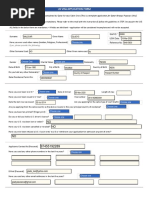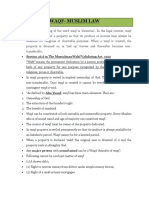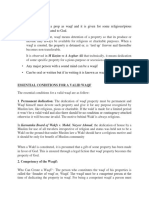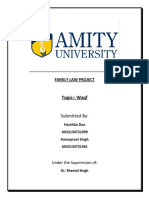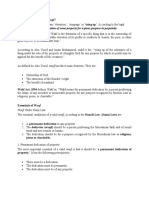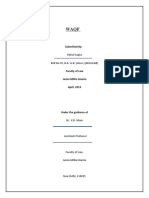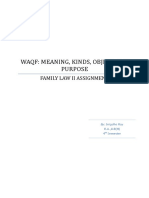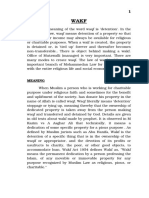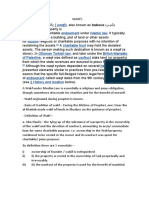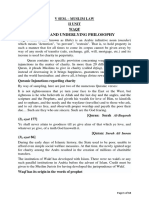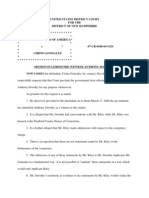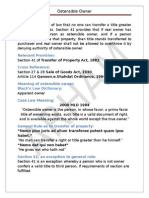0 ratings0% found this document useful (0 votes)
59 viewsWaqf
Waqf
Uploaded by
Heerlina PariuryWaqf refers to the permanent dedication by a Muslim of any property for charitable purposes. There are three main types of waqf: public waqf which supports the poor and needy, family waqf which benefits relatives, and combined public-family waqf. To create a valid waqf, the founder must be an adult of sound mind who owns the property being endowed. The beneficiaries and purpose must also be clearly defined. Once established, a waqf cannot be revoked and will exist in perpetuity. The waqf property is held in trust by the Majlis Agama Islam in Malaysia. Waqf plays an important role in supporting communities and social development.
Copyright:
© All Rights Reserved
Available Formats
Download as PPTX, PDF, TXT or read online from Scribd
Waqf
Waqf
Uploaded by
Heerlina Pariury0 ratings0% found this document useful (0 votes)
59 views9 pagesWaqf refers to the permanent dedication by a Muslim of any property for charitable purposes. There are three main types of waqf: public waqf which supports the poor and needy, family waqf which benefits relatives, and combined public-family waqf. To create a valid waqf, the founder must be an adult of sound mind who owns the property being endowed. The beneficiaries and purpose must also be clearly defined. Once established, a waqf cannot be revoked and will exist in perpetuity. The waqf property is held in trust by the Majlis Agama Islam in Malaysia. Waqf plays an important role in supporting communities and social development.
Original Title
Waqf.pptx
Copyright
© © All Rights Reserved
Available Formats
PPTX, PDF, TXT or read online from Scribd
Share this document
Did you find this document useful?
Is this content inappropriate?
Waqf refers to the permanent dedication by a Muslim of any property for charitable purposes. There are three main types of waqf: public waqf which supports the poor and needy, family waqf which benefits relatives, and combined public-family waqf. To create a valid waqf, the founder must be an adult of sound mind who owns the property being endowed. The beneficiaries and purpose must also be clearly defined. Once established, a waqf cannot be revoked and will exist in perpetuity. The waqf property is held in trust by the Majlis Agama Islam in Malaysia. Waqf plays an important role in supporting communities and social development.
Copyright:
© All Rights Reserved
Available Formats
Download as PPTX, PDF, TXT or read online from Scribd
Download as pptx, pdf, or txt
0 ratings0% found this document useful (0 votes)
59 views9 pagesWaqf
Waqf
Uploaded by
Heerlina PariuryWaqf refers to the permanent dedication by a Muslim of any property for charitable purposes. There are three main types of waqf: public waqf which supports the poor and needy, family waqf which benefits relatives, and combined public-family waqf. To create a valid waqf, the founder must be an adult of sound mind who owns the property being endowed. The beneficiaries and purpose must also be clearly defined. Once established, a waqf cannot be revoked and will exist in perpetuity. The waqf property is held in trust by the Majlis Agama Islam in Malaysia. Waqf plays an important role in supporting communities and social development.
Copyright:
© All Rights Reserved
Available Formats
Download as PPTX, PDF, TXT or read online from Scribd
Download as pptx, pdf, or txt
You are on page 1of 9
WAQF
INTRODUCTION
• Waqf literally means to prevent, restraint.
• In legal terms, it means ‘to protect a thing, to prevent it from becoming the property of
a third person’.
• The Arabic word ‘waqf’ implies that the property is subject to a perpetual trust,
irrecoverable or not to dealt with in any manner that conflicts with the purpose to
which it was originally devoted.
• Once a waqf is created, the property will always remain as waqf property and it ceases
to be subject to the right of private property.
• It belongs neither to the endower nor the beneficiaries as the ownership of waqf
property is immediately vested in Allah the Almighty.
TYPES OF WAQF
Waqf Khayri (Public Waqf)
• An endowment made by the founder to support the general good and welfare
of the poor and the needy in society.
• The founders create this type of waqf in immovable form such as building
mosques, schools, orphanages houses, hospitals, or immovable such as books,
weapons, crops, money, etc
Waqf Ahli (Family Waqf)
• The founder endows his property to his children, grandchildren, relatives or to
the person he specifies.
• If the beneficiaries specified by the founder are no longer alive, then only in
this case will the waqf property be given for public welfare purpose.
Waqf Mushtarak (Combined Public and Family Waqf)
CONDITIONS OF WAQF
The Endower (Waqif)
• any person who has attained the age of 18, of sound mind and rashid may
endow his property as a waqf.
• Rashid is defined as a person who is not an idiot, senile, or declared as a
bankrupt under any written law.
• The law also requires that the waqif must be able to dispose of his property at
his own will and pleasure.
The Property Endowed (Mawquf)
• To create a valid waqf, the law requires that the property should be owned by
the waqif. No one is qualifies to make such disposition unless he has an
independent right of disposing of his property.
• Nonetheless, in case of waqf, it is not necessary that there should be full
freedom from the rights of other parties, as for instance, in cases of lease and
pledge. If a person were to give a lease of his land and before the expiry of the
lease period, create a waqf on that land, the waqf would be binding according
to its terms.
CONDITIONS OF WAQF
The Beneficiaries (Mawquf Alayh)
• The categories of beneficiaries differ according to the class of waqf created.
• If the purpose of the waqf is to benefit the public at large, it is knows as public
waqf. If it is created for a specified charitable purpose or to benefit specific
beneficiaries in the waqf, it is called a private waqf.
Offer and Acceptance (Sighah)
• A waqf shall be created by way of sighah before two witnesses according to
Islamic Law.
• Sighah means a declaration of waqf made either orally, in writing together with
a declaration or by gesture. There must be a clear declaration in order to
express the intention to create a waqf though it is not necessary to use the
word waqf.
LEGAL CONSEQUENCES OF WAQF
• The declaration of waqf must be irrecoverable. Once the waqf is validly
declared, it can no longer be revoked.
• It cannot be made to depend upon a condition and the dedication must be in
perpetuity. Hence, no limitation as to the period of waqf can be made.
• As for the trustee (mutawwali) of the waqf property, the Majlis Agama Islam of
each states in Malaysia (Majlis) has been appointed as the sole trustee of all
waqf, whether waqf am of waqf khas.
• Hence, any appointment other than the Majlis as the trustee of the waqf
property will be void.
- Refer case Tan Kim Luan vs Sabariah binti Md Noor (1995)
LEGALITY OF WAQF
• Although there is no explicit injunction pertaining to the creation of waqf in the
Quran, it is undeniable that the Quran has provided implicit principles for the
application of waqf by indicating the practice of making charitable gifts and
benevolent givings, as well as the redistribution of wealth.
• E.g. Surah al Baqarah : 195, Surah al Imran: 92
• Refer case Re Dato Bentara Luar vs Hassan bin Othman
FORMATION OF WAQF
• A written application must be forwarded to the Majlis informing of the waqif’s
intention to create a waqf.
• The waqif will then be required to execute a waqf deed that must be witnessed
by 2 qualified witnesses according to Islamic Law.
• Upon completion of this process, the waqif will transfer the legal title of the
property to the Majlis.
THE ROLE OF WAQF IN THE COMMUNITY
- Refer to Article: The Role of Waqf in Social Development
KnE Social Sciences / International Conference on Economics, Education, Business and
Accounting (3rd ICEEBA) / Pages 348–352
You might also like
- US Visa Application Form (1) 111 PDFDocument4 pagesUS Visa Application Form (1) 111 PDFGladys Malekar100% (1)
- Federal Arbitration Act PDFDocument2 pagesFederal Arbitration Act PDFNickNo ratings yet
- Analysis of The Concept of Waqf MusDocument7 pagesAnalysis of The Concept of Waqf MusChandni JaiswalNo ratings yet
- WAQfDocument7 pagesWAQfAnam PatelNo ratings yet
- WaqfDocument6 pagesWaqfMADHURI ALLANo ratings yet
- Islamic Personal Law Waqf: Group 5Document17 pagesIslamic Personal Law Waqf: Group 5Maria QadirNo ratings yet
- Saisree - Family Law 2Document7 pagesSaisree - Family Law 2surya srivastavaNo ratings yet
- Fam Class NotesDocument26 pagesFam Class NoteshridayNo ratings yet
- HarshuDocument13 pagesHarshuMukund Madhav DubeyNo ratings yet
- WAKFDocument5 pagesWAKFna.real.8801No ratings yet
- What Is The Meaning of Waqf?Document5 pagesWhat Is The Meaning of Waqf?Adan HoodaNo ratings yet
- Module Vii (1)Document41 pagesModule Vii (1)zephyr ssjNo ratings yet
- FL Module IVDocument52 pagesFL Module IVAeshita MarwahNo ratings yet
- FL Module IVDocument52 pagesFL Module IVansh1976.15No ratings yet
- M5-6 WakfDocument15 pagesM5-6 WakfKamallini GNo ratings yet
- Unit III - WakfDocument20 pagesUnit III - WakfSrinath LNo ratings yet
- WaqfDocument14 pagesWaqfnazima ahmed100% (3)
- Waqf (Udit)Document18 pagesWaqf (Udit)Udit GuptaNo ratings yet
- WaqfDocument17 pagesWaqfDeepak SharmaNo ratings yet
- WaqfDocument15 pagesWaqfMahyuddin KhalidNo ratings yet
- WakfDocument9 pagesWakfshubhrataNo ratings yet
- WAQFDocument8 pagesWAQFaditya.ismadovermeNo ratings yet
- Waqf-Family Law PsdaDocument11 pagesWaqf-Family Law PsdaReeya PrakashNo ratings yet
- Waqf Under Muslim LawDocument10 pagesWaqf Under Muslim LawVaishnavi SoniNo ratings yet
- Waqf NotesDocument7 pagesWaqf NotesKunalKumarNo ratings yet
- Meaning of WakfDocument4 pagesMeaning of WakfDeepesh GulguliaNo ratings yet
- WaqfDocument6 pagesWaqfsubhanali654subNo ratings yet
- Family Law New AssignmentDocument15 pagesFamily Law New AssignmentRahul GuptaNo ratings yet
- WaqfDocument3 pagesWaqfmaniyarwasim9No ratings yet
- Waqf: Meaning, Kinds, Object and Purpose: Family Law Ii AssignmentDocument9 pagesWaqf: Meaning, Kinds, Object and Purpose: Family Law Ii AssignmentRajdeep DuttaNo ratings yet
- Waqvf NotesDocument14 pagesWaqvf NotesMukesh KumarNo ratings yet
- WAQFDocument9 pagesWAQFNasma AbidiNo ratings yet
- Waqf MPL LL B4 23 IJTDocument7 pagesWaqf MPL LL B4 23 IJTzainabramzan489No ratings yet
- Waqf: Meaning, Kinds, Object and PurposeDocument9 pagesWaqf: Meaning, Kinds, Object and PurposeSnigdha RoyNo ratings yet
- Wakf Notes PDFDocument9 pagesWakf Notes PDFCorrupt DevilNo ratings yet
- Waqf Board and It's ExpositionDocument13 pagesWaqf Board and It's ExpositionRahul TiwariNo ratings yet
- Muslim Law 2 WAKFSDocument6 pagesMuslim Law 2 WAKFSHarsha VardhanaNo ratings yet
- 0 Waqf PDFDocument12 pages0 Waqf PDFManisha PatidarNo ratings yet
- FL Presentation - Group 9Document9 pagesFL Presentation - Group 9aditiraj.6204No ratings yet
- WAQFDocument7 pagesWAQFanon_140077520No ratings yet
- Tabarru'at Contract-Zakirullah Ibfim PortalDocument39 pagesTabarru'at Contract-Zakirullah Ibfim Portalbint_bakri87No ratings yet
- Creation and Functioning of Trusts: TrustDocument3 pagesCreation and Functioning of Trusts: TrustShivam SinghNo ratings yet
- AwqafDocument26 pagesAwqafSharifah NurulhudaNo ratings yet
- WasiyatDocument24 pagesWasiyatamrit singhNo ratings yet
- Origin and Underlying Philosophy: V Sem. - Muslim Law Ii Unit WaqfDocument18 pagesOrigin and Underlying Philosophy: V Sem. - Muslim Law Ii Unit WaqfAayush ShuklaNo ratings yet
- Concept and Essentials of A Valid WAKFDocument22 pagesConcept and Essentials of A Valid WAKFajayrupnawar3No ratings yet
- Equity Project Sem X (Animesh 1710)Document9 pagesEquity Project Sem X (Animesh 1710)Animesh GuptaNo ratings yet
- Dr. Ram Manohar Lohiya National Law University: Final Draft On The Concept of Waqf in The Indian Muslim LawDocument7 pagesDr. Ram Manohar Lohiya National Law University: Final Draft On The Concept of Waqf in The Indian Muslim LawAkankshaNo ratings yet
- Waqf A Quick Overview PDFDocument8 pagesWaqf A Quick Overview PDFvaibhav4yadav-4No ratings yet
- Waqf A Quick OverviewDocument8 pagesWaqf A Quick OverviewdestinyNo ratings yet
- Waqf 120619104612 Phpapp02Document15 pagesWaqf 120619104612 Phpapp02Tubagus ThresnaNo ratings yet
- Law of Waqf by Syed HaroonDocument14 pagesLaw of Waqf by Syed HaroonSyed HaroonNo ratings yet
- الوقت في الفقه الاسلاميDocument2 pagesالوقت في الفقه الاسلاميLORD LynxNo ratings yet
- What Is Wakf in Muslim LawDocument4 pagesWhat Is Wakf in Muslim Lawmail.imranpashaNo ratings yet
- MomuDocument43 pagesMomuj2i2m5m9iNo ratings yet
- Untitled DocumentDocument14 pagesUntitled Documentmdjehad33343No ratings yet
- Muslim Law For MidDocument103 pagesMuslim Law For Midj2i2m5m9iNo ratings yet
- Unit III - WillDocument26 pagesUnit III - WillSrinath LNo ratings yet
- Will (Muslim Law)Document11 pagesWill (Muslim Law)Madhav ThakurNo ratings yet
- Lesson 3 Inland WaterwaysDocument23 pagesLesson 3 Inland WaterwaysHeerlina PariuryNo ratings yet
- MIT CTL Blockchain Webinar 2018 PDFDocument27 pagesMIT CTL Blockchain Webinar 2018 PDFHeerlina PariuryNo ratings yet
- Tips & Tricks For Writing Your Thesis in MS Word: Presented by Shelly Baumann, CoordinatorDocument26 pagesTips & Tricks For Writing Your Thesis in MS Word: Presented by Shelly Baumann, CoordinatorHeerlina PariuryNo ratings yet
- Chapter (1) The Conceptual Framework of Accounting: February 2019Document25 pagesChapter (1) The Conceptual Framework of Accounting: February 2019Heerlina PariuryNo ratings yet
- Chapter 8 InventoriesDocument56 pagesChapter 8 InventoriesHeerlina PariuryNo ratings yet
- Conceptual 2015Document450 pagesConceptual 2015Heerlina PariuryNo ratings yet
- AccountDocument315 pagesAccountHeerlina PariuryNo ratings yet
- Lesson 4 Rail OperationsDocument10 pagesLesson 4 Rail OperationsHeerlina PariuryNo ratings yet
- Account Frame CFFFDocument18 pagesAccount Frame CFFFHeerlina PariuryNo ratings yet
- The Role of Waqf in The Third SectorDocument5 pagesThe Role of Waqf in The Third SectorHeerlina PariuryNo ratings yet
- Role of Waqf (Endowment) Funds in Financing Small Projects: Ajloun National University, JordanDocument14 pagesRole of Waqf (Endowment) Funds in Financing Small Projects: Ajloun National University, JordanHeerlina PariuryNo ratings yet
- WaqfDocument8 pagesWaqfHeerlina PariuryNo ratings yet
- How Things Work (Phy 1) : Laws of Motion (Part 2)Document16 pagesHow Things Work (Phy 1) : Laws of Motion (Part 2)Heerlina PariuryNo ratings yet
- Chapter 5 AAOIFI and MASBDocument21 pagesChapter 5 AAOIFI and MASBHeerlina PariuryNo ratings yet
- WaqfDocument8 pagesWaqfHeerlina PariuryNo ratings yet
- The Role of Waqf in Social Development: Conference PaperDocument5 pagesThe Role of Waqf in Social Development: Conference PaperHeerlina PariuryNo ratings yet
- D4.3 EU Terminal Productivity IndicatorDocument31 pagesD4.3 EU Terminal Productivity IndicatorHeerlina PariuryNo ratings yet
- Script 1Document3 pagesScript 1Libay Villamor Ismael100% (5)
- Law - T4 Consideration, IntensionDocument3 pagesLaw - T4 Consideration, Intension包子No ratings yet
- Reno 329Document2 pagesReno 329keith in RINo ratings yet
- Ethics 2Document61 pagesEthics 2Rica Santos-vallesteroNo ratings yet
- Massage Contractor AgreementDocument4 pagesMassage Contractor AgreementFitzgerald PachecoNo ratings yet
- QQR Labor UstDocument87 pagesQQR Labor UstRod Panay100% (1)
- James C. Schum v. South Buffalo Railway Co., 496 F.2d 328, 2d Cir. (1974)Document7 pagesJames C. Schum v. South Buffalo Railway Co., 496 F.2d 328, 2d Cir. (1974)Scribd Government DocsNo ratings yet
- Terms of Use: (A) Reserved Rights and Grant of Limited LicenseDocument2 pagesTerms of Use: (A) Reserved Rights and Grant of Limited LicensePratibha TripathiNo ratings yet
- Jacutin v. PeopleDocument4 pagesJacutin v. PeopleLeo Mark LongcopNo ratings yet
- Principle of Abuse of RightsDocument2 pagesPrinciple of Abuse of RightsJonathan Andrew PepitoNo ratings yet
- Trueprofessionals and Practitioners in Social Work TrueDocument27 pagesTrueprofessionals and Practitioners in Social Work TrueShannaiah Kim Bali100% (2)
- 2003 Cri. L. J. 3731 PDFDocument5 pages2003 Cri. L. J. 3731 PDFANAND BRAHMBHATT (AN ADVOCATE)No ratings yet
- KL vs. Marc StevensDocument9 pagesKL vs. Marc StevenswillNo ratings yet
- Rodolfo Melendez Manriquez, A089 599 983 (BIA Nov. 25, 2016)Document15 pagesRodolfo Melendez Manriquez, A089 599 983 (BIA Nov. 25, 2016)Immigrant & Refugee Appellate Center, LLCNo ratings yet
- Rule 78 Letters Testamentary and of AdministrationDocument3 pagesRule 78 Letters Testamentary and of AdministrationMRose SerranoNo ratings yet
- Human Trafficking in IndiaDocument18 pagesHuman Trafficking in IndiaDiksha OraonNo ratings yet
- Women in Pre-Islamic Arabia: IndtroductionDocument8 pagesWomen in Pre-Islamic Arabia: IndtroductionJayvikrant RAJPOOTNo ratings yet
- Robert Patten v. Florida, 474 U.S. 876 (1985)Document4 pagesRobert Patten v. Florida, 474 U.S. 876 (1985)Scribd Government DocsNo ratings yet
- Labor Cases.Document46 pagesLabor Cases.ProzNo ratings yet
- Contracts SchoolDocument92 pagesContracts SchoolvalNo ratings yet
- Brief Amici Curiae of NFIB Small Business Legal Center, Et Al, Love Terminal Partners, L.P. v. United States, No. 18-1062 (Mar. 15, 2019)Document28 pagesBrief Amici Curiae of NFIB Small Business Legal Center, Et Al, Love Terminal Partners, L.P. v. United States, No. 18-1062 (Mar. 15, 2019)RHTNo ratings yet
- G54449 00 John Brumby Premier COMPLAINT EtcDocument28 pagesG54449 00 John Brumby Premier COMPLAINT EtcGerrit Hendrik Schorel-HlavkaNo ratings yet
- Be It Enacted by The Senate and House of Representatives of The Philippines in Congress AssembledDocument47 pagesBe It Enacted by The Senate and House of Representatives of The Philippines in Congress AssembledFayda CariagaNo ratings yet
- Ecolab v. FMCDocument5 pagesEcolab v. FMCPriorSmartNo ratings yet
- Commission Ibp Verified Cmplaint Six Copy Send To IbpDocument28 pagesCommission Ibp Verified Cmplaint Six Copy Send To IbpSulong Pinas JRNo ratings yet
- Luz Farms vs. DAR DigestDocument3 pagesLuz Farms vs. DAR DigestEva TrinidadNo ratings yet
- Introductio 1Document3 pagesIntroductio 1Umaima ShafaqNo ratings yet
- Term 3 B1 RMEDocument2 pagesTerm 3 B1 RMEwisysavage21No ratings yet
